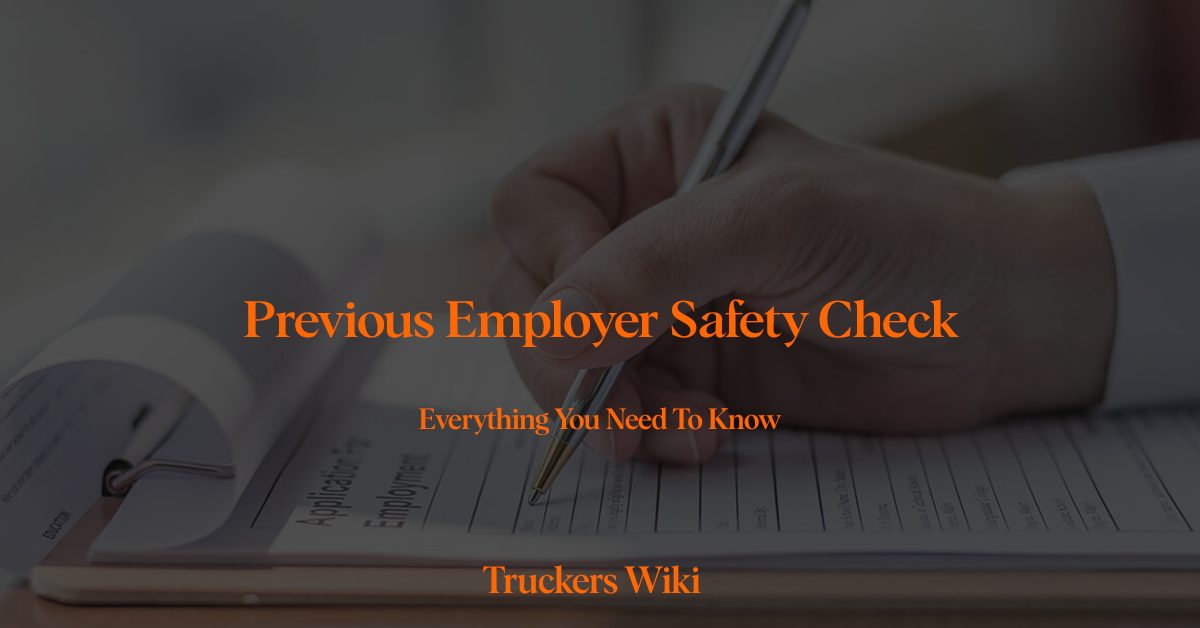
Table of Contents
What is the Previous Employer Safety Check
The Previous Employer Safety Check is an assessment of a truck driver’s past three-year safety record with previous employers, as required by the FMCSA.
Important Update 2023
Starting January 6, 2023, trucking employers will only use the Drug and Alcohol Clearinghouse to check if a potential driver has any outstanding drug or alcohol issues as per FMCSA rules.
The Importance of Safety Checks
Safety checks are essential for multiple reasons:
Regulatory Compliance
The FMCSA mandates carriers to investigate the past three years of an applicant’s driving record, ensuring they meet the standards set by regulations.
Risk Management
Knowing a potential hire’s safety history helps companies manage risks better. Understanding past incidents or violations can guide decisions on training or monitoring needs.
Cultivating Safety Culture
By making safety checks a norm, carriers send a clear message about the value they place on safety, influencing company culture and standards.
What Does the Process Involve?
Requesting Records
When a driver applies to a new job, carriers must seek records from the applicant’s previous employers. This requires written consent from the driver. Employers are obligated to provide the records if asked, and the new employer must maintain these records for three years.
Information to Seek
The information typically includes:
- Any drug or alcohol violations.
- Accident history.
- Other safety-related incidents or violations.
It’s essential to note that while previous employers can report drug and alcohol violations, they can’t provide actual test results.
Fair Reporting
It’s critical that previous employers provide accurate and fair records. They should avoid sharing opinions or unverified incidents. A framework based on facts ensures that drivers are evaluated fairly.
Challenges and Solutions
While the process seems straightforward, it can face challenges:
Incomplete Information
Not all previous employers may keep detailed records or might be unreachable.
Varied Standards
Different companies may have varied standards or definitions of safety violations.
To counter these challenges, it’s vital for carriers to:
- Have a clear and structured onboarding process.
- Use standardized forms and checklists.
- Educate hiring teams about the FMCSA regulations.
- Encourage a transparent dialogue with potential hires.
Regulation of Previous Employer Safety Checks
Governing Regulations
The requirement for carriers to perform safety checks on potential hires is mandated by the FMCSA’s regulations, particularly under 49 CFR Part 391. This section of the Code of Federal Regulations deals with qualifications of drivers and longer combination vehicle (LCV) driver instructors. Specifically, Section 391.23 delineates the investigations and inquiries that carriers must undertake regarding a driver’s background.
Detailed Requirements
As per 49 CFR 391.23, carriers are mandated to:
- Investigate the driver’s employment record for the past three years.
- Make inquiries to the driver’s previous employers about accident history, alcohol and drug violations, and other safety-related information.
- Obtain the driver’s driving record from every State in which the driver held a motor vehicle operator’s license or permit during the preceding three years.
- Have the driver complete a detailed application that covers the previous ten years of employment history.
Enforcement of the Regulation
Audits and Compliance Reviews
The FMCSA and its state partners regularly conduct compliance reviews and safety audits on carriers. During these reviews, they may check if the carriers are correctly following the stipulations of 49 CFR 391.23 by properly investigating the backgrounds of their drivers.
Penalties for Non-compliance
Carriers that fail to adhere to the regulation can face a range of penalties, from fines to being declared “unfit” to operate. The severity of the penalty often depends on the nature and frequency of the violation.
Driver’s Protection Rights
It’s essential to note that drivers have rights in this process too. Under the FMCSA regulations, previous employers must provide the information requested by the prospective employer within 30 days. Additionally, once the investigation is completed, drivers have the right to review the information provided by previous employers, request corrections, or rebut any information they believe to be incorrect.
External Links
As of January 6, 2023, employers subject to § 382.701(a) of this chapter must use the Drug and Alcohol Clearinghouse to comply with the requirements of this section with respect to FMCSA-regulated employers.
Code of Federal Regulations
Listen to The Article Here
Audio Article Previous Employer Safety Check What is the
Last modified: September 28, 2023

